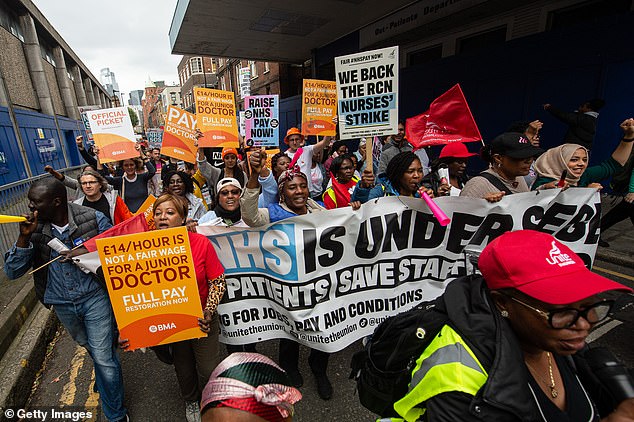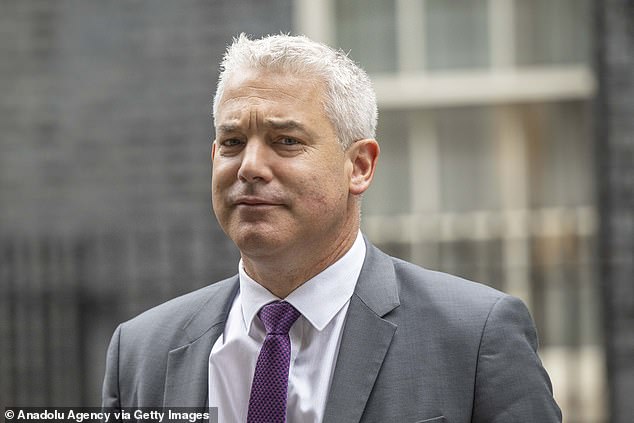NHS strikes may have caused as many as two million appointments to be cancelled, health leaders warn
The NHS strikes are likely to have been far more disruptive than previously feared, with two million appointments cancelled, health leaders warned last night.
Four days of industrial action by doctors led to 130,000 operations and consultations being postponed last week, official new figures show.
This brings the total number affected at the last minute to 1,015,067 since nurses first walked out in December.
However, the NHS Confederation, which represents healthcare organisations, said the actual number was likely to double as many hospitals have stopped taking appointments on strike days.
Rory Deighton, director of the confederation’s acute network, described the figures as ‘scary’, adding: ‘The actual scale of canceled appointments could be much higher as the official figures only record cancellations on the day.
A total of 1,015,067 surgeries and consultations have been affected by strikes since nurses first walked out in December (photo: doctors struck in London last week)

Four days of industrial action by doctors led to 130,000 operations and consultations being postponed last week, official new figures show (Image: Doctors strike in London last week)
‘NHS trusts are now routinely getting ahead of strikes by not filling spaces that could otherwise be used for elective activities, meaning operations and appointments often go unbooked. So our members tell us that the actual impact is much greater, perhaps as much as double what the figures show.’
Mr Deighton said strikes have cost the NHS around £1 billion, with hospitals spending huge sums on paying consultants overtime to cover absent junior colleagues.
The consultants walked away on Tuesday and Wednesday, and were joined by trainee doctors on Wednesday.
The junior doctors’ strike then lasted until 7 a.m. on Saturday morning.
At the height of the action on Wednesday, 26,802 staff were absent from work due to industrial action.
Both groups will strike again for three days next week ahead of the Conservative Party conference in Manchester.
It comes as waiting lists are at a record high of 7.7 million and hospitals are trying to tackle a huge backlog created during the Covid pandemic.
Health leaders had described the first joint strike as a “nightmare scenario” and a “step too far”, warning that patients would be put at risk.

Health Secretary Steve Barclay (pictured) called on NHS staff to accept the deal on offer
Health Secretary Steve Barclay said: ‘Today marks the grim milestone of more than 1 million canceled appointments due to strikes, with co-ordinated and calculated industrial action by the British Medical Association creating further disruption and misery for patients and NHS colleagues.
‘Unfortunately, the BMA is threatening to re-escalate strike action next month, which would mean further increases in cancellations and increased pressure on the healthcare system as we head into winter.
“Doctors have received a fair and reasonable pay increase as recommended by the independent pay review bodies.
‘My door is always open to discuss how we can work with NHS staff to improve their working lives, but this award is final, so I urge the unions to put an end to this damaging disruption. ‘
Dr. Vin Diwakar, national medical director for secondary care and transformation at NHS England, said: ‘These figures reveal just some of the brutal impact of strikes over the past ten months, with the number of rescheduled appointments exceeding 1 million, as pressure on Services increased as trainee doctors and consultants took joint action last week for the first time in the history of the NHS.
‘We know that every rescheduled appointment is incredibly difficult for patients and families, and as we prepare for further joint action next week, there is precious little time for staff and services to recover.’
Lance McCarthy, the chief executive of Princess Alexandra Hospital Trust, told the Hertfordshire and West Essex Integrated Care Council on Friday: ‘We should not underestimate the impact of industrial action.’
Saffron Cordery, deputy chief executive of NHS Providers, which represents NHS trusts, said: ‘We cannot continue like this. It’s an uphill battle.
‘The consequences of each successive strike are deeper, wider and take longer to resolve, contributing to the rising costs of trusts.’
